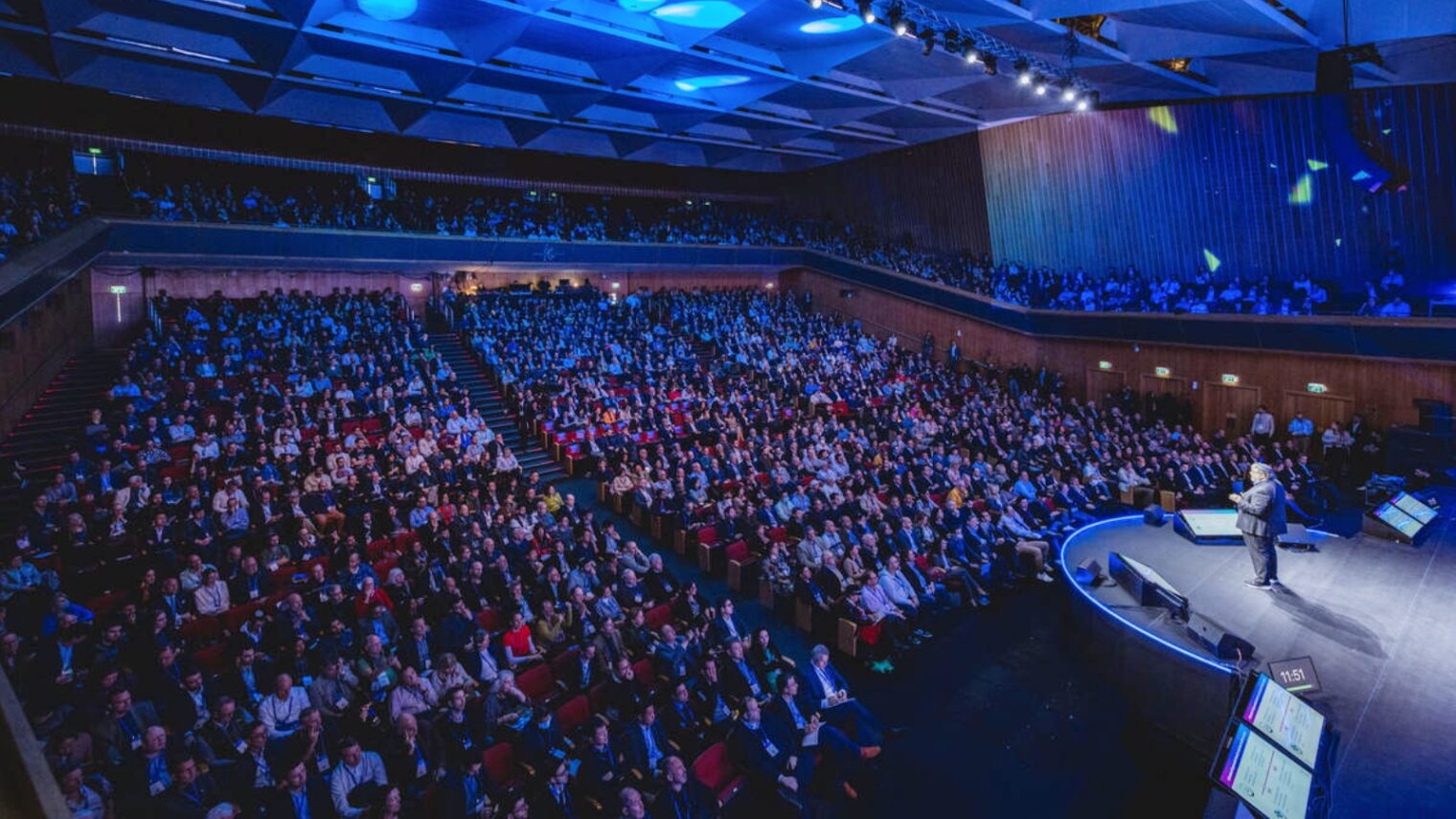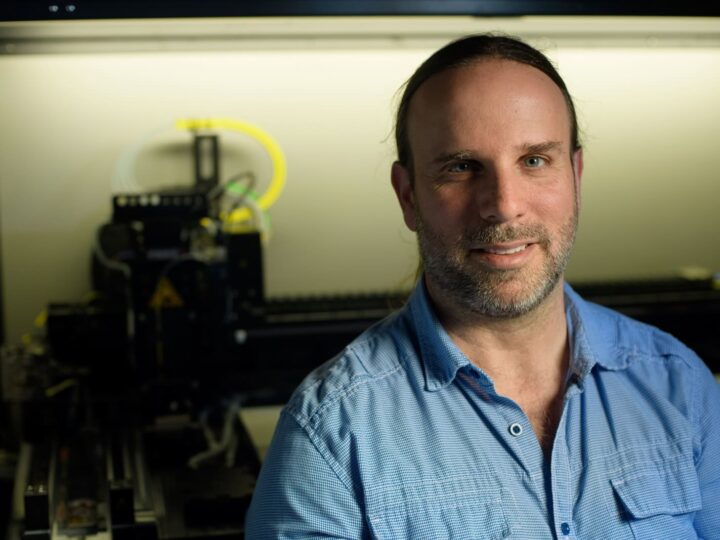There’s a joke about lavish Israeli tech conferences. “Come for the speeches but stay for the food.”
OurCrowd, the Jerusalem-based crowdfunding platform that allows anyone with a minimum of $10,000 to invest in selected startups, and that has over $2.1 billion in capital commitments, has for most of its 10-year existence been the master of Israeli conventions, bringing thousands of investors to meet with the group’s hundreds of portfolio companies.
OurCrowd’s annual Global Investor Summit, held at Jerusalem’s International Convention Center, is also known for its top-quality complementary cuisine.
As I sat through a noontime seminar on the future of electric cars during last Wednesday’s summit, I looked forward to the wide variety of savory treats awaiting me in the main food court. Alas, by the time I arrived there was no longer any schnitzel or stroganoff… not even a pita with hummus was to be found.
So I wandered into the food-tech pavilion where, to my delight, a line (long but manageable) leading to the SavorEat booth promised 3D-printed plant-based burgers in a bun, complete with ketchup and pickles.
I’d reviewed SavorEat for ISRAEL21c in 2021 and found the burgers good but not quite up to Redefine Meat or Impossible standards.
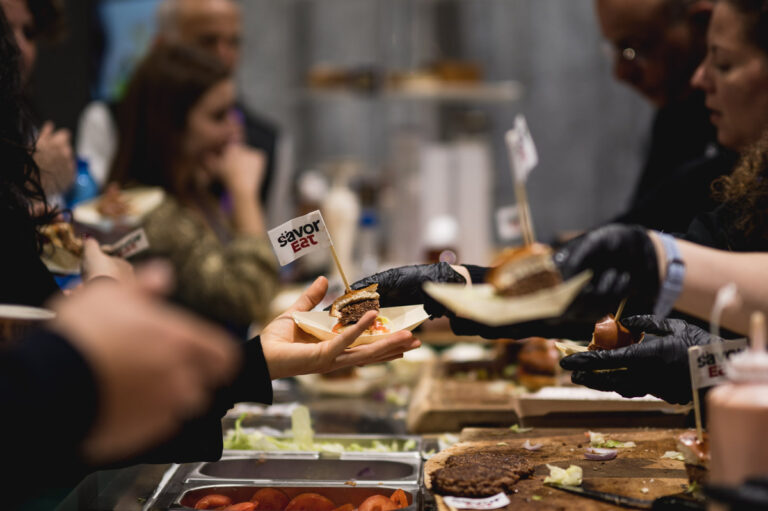
“Has the taste improved?” I asked the woman manning the 3D printing units. “A lot,” she said, handing me a burger. I’m happy to report that SavorEat’s meatless patties are closer to a cow-based burger than Beyond Meat ever gets.
Still hungry, I ambled over to the DouxMatok booth, where I sampled muffins sweetened with the company’s flagship Incredo Sugar, which reduces the sugar content by 30% to 50% compared with regular sugar.
Topped with the company’s own version of the popular hazelnut spread, Nutella, the tasty muffin was just as sweet as the conventionally sweetened peanut-butter chocolate squares I tasted at a different booth.
Food fest
Food-tech was a major theme at this year’s sold-out OurCrowd Summit, which had more than 9,000 people registered from 81 countries and for the first time charged an entrance fee for non-accredited investors.
Food-tech was emphasized from the very first plenary session when celebrity chef Nir Zook wheeled out a mini-kitchen and cooked up plant-based salmon from Israeli startup Plantish, along with a pair of lab-grown lamb chops (cultured, not plant-based).
Another chef, Michal Ansky of Israeli Master Chef fame, tasted Zook’s creations. She liked the salmon but went absolutely ga-ga over the meat.
There are some 230 food-tech companies in Israel; between 2021-2022, they raised over $1 billion ($618 million in 2012 and $473 million in 2022).
OurCrowd backs food-tech incubator Fresh Start. Under the auspices of the Israel Innovation Authority, Fresh Start also has funding from Israeli food and beverage conglomerates Tnuva and Tempo.
Saving the planet
Food-tech was one part of the overall theme at the Summit: “Startups saving the planet.”
Improving global food security is key to meeting that lofty goal, but so is capturing carbon from the atmosphere and reducing the impacts of climate change.
Cameron Jones took to the stage to speak about the efforts his OurCrowd-backed company, Flash Forest, which aims to use drones to plant a billion trees by 2028. Trees are natural carbon capturers.
Eyal Harel, CEO of BlueGreen Water Technologies, described how his company’s water-based carbon removal tech has already sequestered some 3.3 million tons of carbon from the air, transforming it into inert limestone.
Talmon Marco, CEO of H2Pro, talked about his firm’s breakthrough in water electrolysis, a method for creating green hydrogen. H2Pro claims its electrolysis system is over 95% efficient. Hydrogen is the only non-fossil fuel with enough energy density to power a long-distance plane ride or a ship crossing the ocean.
Electrification was not left out. Rani Plaut, CEO of AIR, which is developing the AIR ONE flying car, appeared on the panel “Navigating the Challenges of an EV-driven World.” AIR’s flagship eVTOL (electric vertical take-off and landing) craft is powered by the same kind of batteries as in electric cars. (AIR displayed its vehicle at the summit, creating quite the electric buzz.)
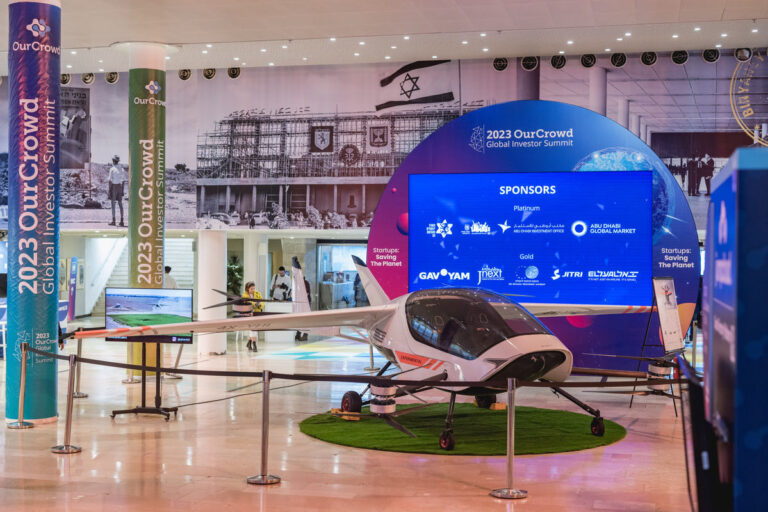
Roy Fridman, CEO of C2A Security, spoke about cybersecurity challenges with electric vehicles (hackers can get in not only through the car itself but via the charging station), and Avinoam Rubinstain of Carrar provided more details about his company’s critical tech that ensures batteries remain at the right temperature so they don’t degrade quickly.
Abraham Accord partners
The biggest cheers of the day went to Abdulla Abdul Aziz Al Shamshi, director general of the Abu Dhabi Investment Office, who affirmed his support for Israeli innovation and the Abraham Accords.
A large pavilion of companies from Abu Dhabi exhibited under the banner “the Capital of Capital,” including a representative from the UAE housing department who came to recruit Israelis to live in Abu Dhabi. “We’re even building the UAE’s first synagogue,” he told me.
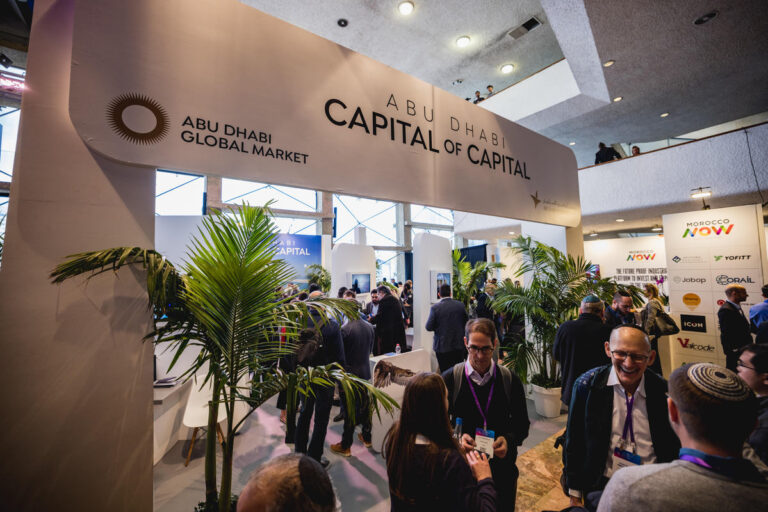
Salmaan Jaffery, chief business development officer of the Dubai International Financial Center, added that Dubai startups have attracted some $615 million in investments.
Other pavilions highlighted startups and organizations in Morocco and Hong Kong.
In the summit’s final plenary, former Soviet dissident-turned-Israeli-politician/human rights activist Natan Sharansky spoke about what’s happening in Ukraine, where he was born.
There was a fireside chat between OurCrowd CEO Jonathan Medved and US Ambassador to Israel Tom Nides.
Medved awarded the Maimonides Award to 93-year-old Morris Kahn, who founded Israeli communications leader Amdocs and provided significant backing and leadership to SpaceIL’s Beresheet mission to the Moon.
Judicial reform
This being Israel at a highly charged political moment in time, the issue of how the current coalition’s proposed judicial reform will affect the country’s economy could not be entirely overlooked, especially when the first keynote speaker was Israeli President Isaac Herzog who, on Sunday, unveiled a compromise plan to bridge the gaps between proponents and opponents of the reform.
“I’m doing my best to direct this debate into constructive dialogue that will lead to an agreed-upon result that will strengthen and foster and protect Israeli democracy,” Herzog told the packed morning plenary.
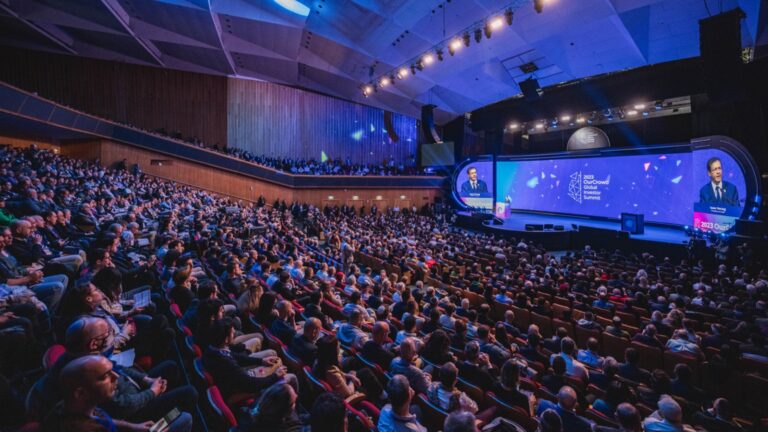
Later in the day, three Israeli-American historians took to the stage: former Israeli Ambassador to the US Michael Oren; Saul Singer, co-author of “Start-up Nation”; and McGill University Professor Gil Troy.
They discussed “Israel 2048” (also the name of Oren’s new book). The room was too small for the overflow crowd, which stretched far into the hallway.
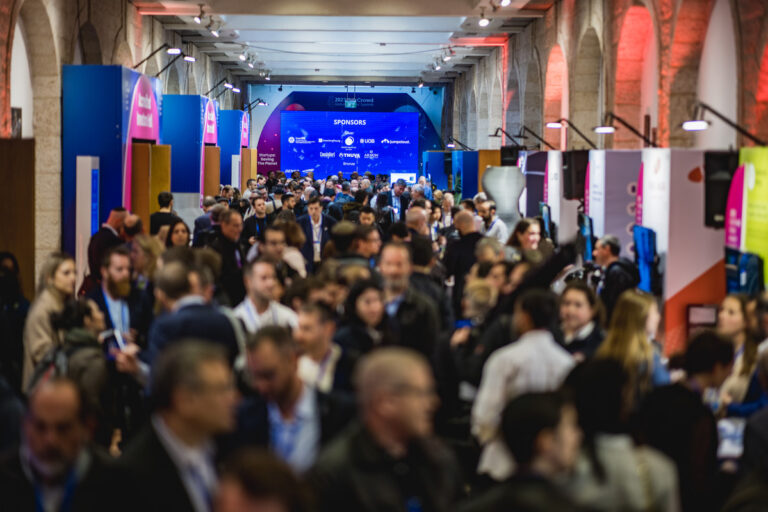
While none of the speakers are fans of the current government’s policies, they tried to stay upbeat – this was a tech conference after all; no need to scare off investors.
Clinical trial at the summit
This was the first OurCrowd Summit since February 2020. The last two events were canceled due to the Covid-19 pandemic.
This year, only a few attendees wore facemasks, leading several concerned conference-goers to wonder if they were in the midst of a potential super-spreader event. (At my last Global Investor Summit, I came home with the flu.)
Canadian-Israeli startup SaNOtize pounced on those concerns with what cofounder and chief science officer Chris Miller told me was the “world’s first double-blind clinical trial launched at a convention.”
SaNOtize makes a nitric-oxide non-antibiotic nasal spray called Enovid (also sold in some countries under the brand names VirX and FabiSpray) which the company claims can inactivate 99% of Covid-19 isolates; it’s also highly effective against other nasal-borne or upper respiratory-attacking viruses such as the flu.
SaNOtize signed up hundreds of attendees to participate in a clinical trial of its spray. Half the recipients received the real thing, half a placebo saline solution.
“What happens if you got the sham version, and you wind up getting Covid or the flu?” I wondered.
“We stop the clinical trial and immediately send you the real spray,” said Miller, who says he’s been using Enovid prophylactically for 10 years and has never gotten either the flu or, more recently, Covid.
The SaNOtize kit included the spray and five Covid and flu tests, plus links to videos showing participants how to administer their Enovid. Daily email reminders are sent.
SaNOtize has taken the opposite approach to most Israeli startups: The research and development was done in Canada, but the manufacturing is in Israel. Why? I asked Miller.
“Israel was simply faster. It would have taken us 18 months to ramp up production in North America,” Miller replied. Israel-based Dr. Gilly Regev is the company’s CEO.
Will this be the new trend in conferences – a little tech, a little Covid and flu prevention? If the OurCrowd Summit is any indication, you may be getting a nasal spray in your next tote bag of swag.




